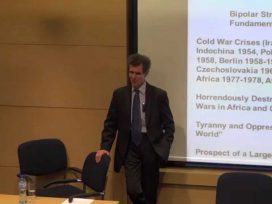Nothing was inevitable. If the Soviet Union had wanted, it could have easily stopped the process that led to the dissolution of the Communist bloc in 1989 – says Professor Mark Kramer, director of the Cold War Studies Program at Harvard University. As he sees it, the changes were ultimately caused by three factors, neither sufficient in itself: the fundamental change in Soviet policy reflected in Mikhail Gorbachev’s commitment to promote far-reaching reform and avoid the use of violence in Eastern Europe, the willingness of millions of ordinary people to go out onto the streets to demand freedom, and the rapid demoralization of hardline East European leaders as they realized that the Soviet Union would not come to their aid against internal rebellion.

